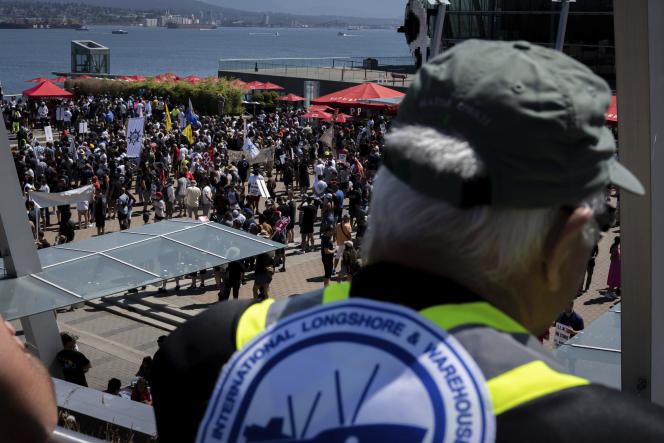The strike lasted thirteen days. The social movement that paralyzed several ports on the west coast of Canada, including the largest in the country, in Vancouver, ended Thursday, July 13, arousing the relief of the government and many commercial actors.
British Columbia Maritime Employers Association (BCMEA) and International Longshoremen’s and Warehousemen’s Union of Canada (ILWUC) “have reached an agreement in principle on a new four-year agreement”the BCMEA said in a statement, as 7,000 terminal loaders and 49 employers in 30 ports went on strike on 1er July after months of fruitless negotiations. The deal still needs to be ratified, the BCMEA added, without giving further details.
Subcontracting, port automation and the cost of living were the main reasons for the union’s collective action. The duration of the strike and its consequences aroused the concern of many crucial economic sectors, like the automobile industry, which called on the government to intervene to settle the conflict as soon as possible.
“The strike is over”Federal Labor Minister Seamus O’Regan said on Twitter. “The scale of these disturbances is considerable”, he pointed out in a joint statement with the Minister of Transport, Omar Alghabra. The announcement of the agreement was welcomed by the Canadian Chamber of Commerce, whose president, Perrin Beatty, also considered that “the Canadian economy [avait] been seriously damaged during these thirteen days”.
“Rebuilding our reputation”
According to the Greater Vancouver Chamber of Commerce, the “longest strike in almost forty years” disrupted trade to the tune of 9.9 billion Canadian dollars (6.7 billion euros).
“In the future, we must rebuild our reputation as a stable business partner”said its director, Bridgitte Anderson, in a press release. “It will take months before the supply chain returns to normal”underlined the Canadian Federation of Independent Business, calling on the government to “consider ports as an essential service”.
The total value of estimated cargo awaiting unloading is at least C$3 billion, according to a Royal Bank of Canada report released this week. Every day, goods crucial to exports (coal, wheat, rapeseed, food products, etc.) and imports (clothing, petroleum products, cars and automobile parts, etc.) pass through these ports.
Vancouver alone trades approximately C$305 billion worth of goods every year and contributes C$11.9 billion to Canada’s GDP.
